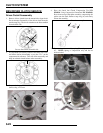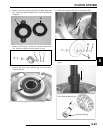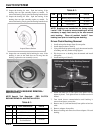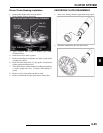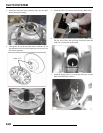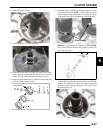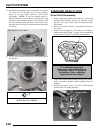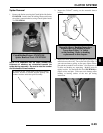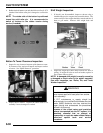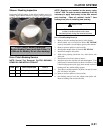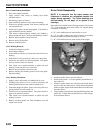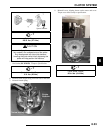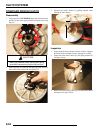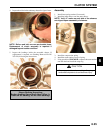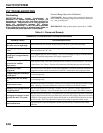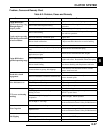
6.30
CLUTCH SYSTEM
4. Rubber backed buttons can and should be used in all ATV
clutches if the hollow roller pin is changed to a solid roller
pin.
NOTE: The rubber side of the button is positioned
toward the solid roller pin. It is recommended to
switch all buttons to the rubber version during
service (if needed).
Button To Tower Clearance Inspection
1. Inspect for any clearance between spider button to tower.
If clearance exists, replace all buttons and inspect surface
of towers. See “Spider Removal” procedure.
2. Inspect sheave surfaces. Replace the entire clutch as an
assembly if worn, damaged or cracked.
Shift Weight Inspection
1. If clutch is not disassembled, inspect as shown, using a
clutch holding tool to compress the moveable sheave. The
contact surface of the weight should be smooth and free of
dents or gall marks. Remove shift weight bolts and
weights.
2. Inspect the weight pivot bore and pivot bolts for wear or
galling. If weights or bolts are worn or broken, replace in
sets of three with new bolts.
NOTE: A damaged shift weight is usually caused by
a damaged or stuck roller in the spider assembly.
See roller inspection, see “Roller, Pin, and Thrust
Washer Inspection”.
Button to Tower Clearance: .000-.001
WARNING
The clutch assembly is a precisely balanced unit.
Never replace parts with used parts from another
clutch assembly!
All PVT maintenance or repairs should be
performed only by a certified Polaris Master Service
Dealer (MSD) technician who has received the
proper training and understands the procedures
outlined in this manual.
Because of the critical nature and precision
balance incorporated into the PVT system, it is
absolutely essential that no attempt at
disassembly or repair be made without factory
authorized special tools and service
procedures.



